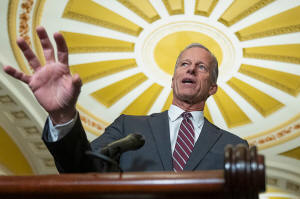Senate clears way to block clean air standards in California, including
vehicle emission rules
[May 22, 2025]
By MARY CLARE JALONICK
WASHINGTON (AP) — Senate Republicans on Wednesday voted to establish a
new precedent that will allow them to roll back vehicle emission
standards in California, including a rule phasing out the sale of new
gas-powered cars by 2035.
The winding series of Senate procedural votes that went late into the
evening could have profound implications for California’s longstanding
efforts to reduce air pollution. It also established a new, narrow
exception to the Senate filibuster even as Republicans have insisted
that they won’t try to change Senate rules.
Democrats strongly objected to the move, delaying the votes for hours as
Senate Majority Leader John Thune, R-S.D., cleared the way procedurally
for Republicans to bring up three House-passed resolutions that would
block the rules. The Senate could pass the resolutions later this week.
At issue are the three California rules — phasing out gas-powered cars,
cutting tailpipe emissions from medium- and heavy-duty vehicles and
curbing smog-forming nitrogen oxide pollution from trucks.
Republicans say the phase out of gas-powered cars, along with the other
rules, is costly for consumers and manufacturers, puts pressure on the
nation’s energy grid and has become a de facto nationwide electric
vehicle mandate. Democrats charge that Republicans are acting at the
behest of the oil and gas industry and say that California should be
able to set its own standards after obtaining waivers from the
Environmental Protection Agency.
Thune said this week that the waivers “go far beyond the scope Congress
contemplated in the Clean Air Act” and said they “endanger consumers,
our economy and our nation’s energy supply.”

Also at issue is the Senate as an institution, and longstanding
filibuster rules that both parties have rolled back over the last two
decades. While the Republicans’ effort is narrow, it is one of several
increasingly partisan efforts to push legislation through the Senate on
party-line votes.
Through the series of votes Wednesday, Republicans set precedent for the
Senate to reject the state EPA waivers with a simple majority vote. They
made that move even after the Senate parliamentarian agreed with the
Government Accountability Office that California’s policies are not
subject to the Congressional Review Act, a law that allows Congress to
reject federal regulations under certain circumstances.
“Republicans tonight cross a point of no return for the Senate,
expanding what this chamber can do at a majority threshold,” Senate
Democratic leader Chuck Schumer said on the Senate floor as he moved to
delay the votes. He called the Republicans “fair-weather
institutionalists.”
Both parties have made major moves to roll back the filibuster — which
requires a 60-vote threshold — in recent years.
[to top of second column]
|

Senate Majority Leader John Thune, R-S.D., speaks to reporters at
the Capitol, Tuesday, May 20, 2025, in Washington. (AP Photo/Manuel
Balce Ceneta)

Democrats voted in 2013, under President Barack Obama, to lower the
vote threshold to a simple majority for all presidential nominees,
with the exception of the Supreme Court. In 2017, during President
Donald Trump’s first term, Republicans rolled back the remaining
filibuster rules to confirm Supreme Court Justice Neil Gorsuch, a
rule that Democrats maintained in confirming Justice Ketanji Brown
Jackson in 2022. That same year, Democrats unsuccessfully attempted
to roll back the legislative filibuster but were thwarted by some in
their own party who opposed the move.
Republicans have argued this week that they are simply reinforcing
Senate rules, and federal laws, that are already in place.
“We are not talking about doing anything to erode the institutional
character of the Senate; in fact, we are talking about preserving
the Senate’s prerogatives," Thune said.
The votes to roll back California standards come after years of
Republican efforts to block them. The Trump administration in 2019
revoked California’s ability to enforce its own emissions standards,
but President Joe Biden later restored the state’s authority.
Republicans have argued that the rules effectively dictate standards
for the whole country, imposing what would eventually be a
nationwide electric vehicle mandate. Around a dozen states have
already followed California’s lead.
California for decades has been given the authority to adopt vehicle
emissions standards that are stricter than the federal government’s.
California Gov. Gavin Newsom, a Democrat, announced plans in 2020 to
ban the sale of all new gas-powered vehicles within 15 years as part
of an aggressive effort to lower emissions from the transportation
sector. Plug-in hybrids and used gas cars could still be sold.
The Biden administration approved the state’s waiver to implement
the standards in December, a month before Trump returned to office.
The California rules are stricter than a Biden-era rule that
tightens emissions standards but does not require sales of electric
vehicles.
Biden’s EPA said in announcing the decision that opponents of the
California waivers did not meet their legal burden to show how
either the EV rule or a separate measure on heavy-duty vehicles was
inconsistent with the Clean Air Act.
Newsom has evoked Richard Nixon and Ronald Reagan, who signed
landmark environmental laws, as he has fought congressional
Republicans and the Trump administration on the issue.
“The United States Senate has a choice: cede American car-industry
dominance to China and clog the lungs of our children, or follow
decades of precedent and uphold the clean air policies that Ronald
Reagan and Richard Nixon fought so hard for,” he said this week.
All contents © copyright 2025 Associated Press. All rights reserved |